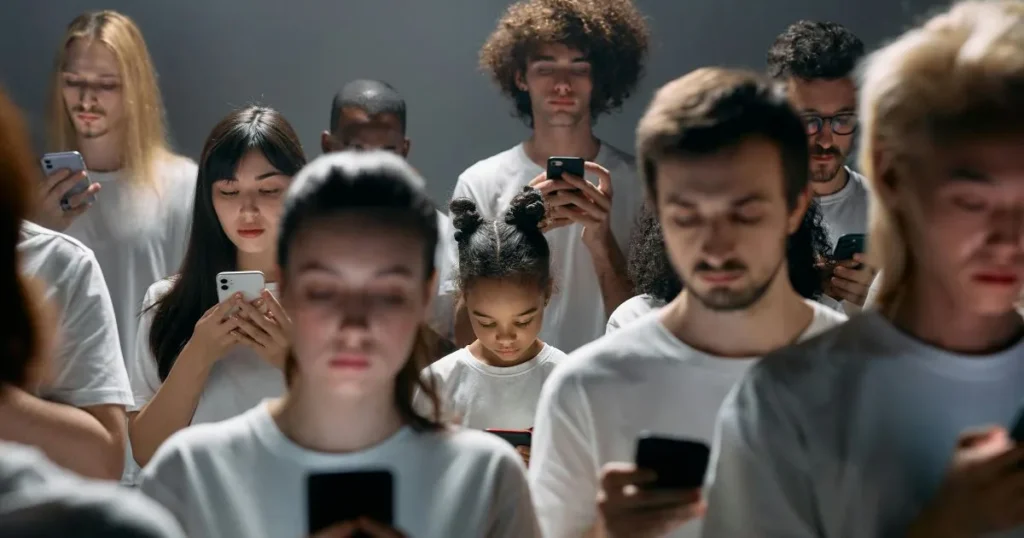Technology Affecting Mental Health, because the link between tech and mental health is critical. We spend a lot of time on our devices, getting information, having fun, and engaging in social interaction, which affects our mental health in big ways.
Our attention span changes, and we face anxiety and depression. The effect of tech on our minds is apparent. We must understand this to use tech wisely and protect our mental health.
This article will examine how tech affects our mental health and how our digital lives impact our inner peace. Knowing these points can help us use tech for good and avoid its negative aspects.
Table of Contents
Key Takeaways
- The interplay between technology and mental health has become a crucial topic of discussion in our digital age.
- Technology can have both positive and negative impacts on our psychological well-being, from attention span changes to struggles with anxiety and depression.
- This article will explore six critical effects of technology on mental health, providing insights to help us navigate the complex relationship between our digital world and inner well-being.
- Understanding these critical effects can empower us to harness technology’s benefits while mitigating its detrimental impact on our mental health.
- By staying informed and proactive, we can strike a healthier balance between the convenience and potential pitfalls of our technology-driven lives.
Understanding the Digital Age Impact on Mental Wellness
Today, technology is a big part of our lives, changing how we connect with the world. It brings both good and bad effects on our mental health. Let’s look at the primary mental health issues that have come up because of technology.
The Evolution of Tech-Human Interaction
Technology has grown fast, changing how we talk, work, and play. Smartphones and social media have made our lives more digital, which has affected our mental health a lot.
Current Digital Landscape Statistics
A study shows that the average American adult uses their phone for almost 3 hours daily. Most of this time is spent on social media and other digital stuff. This constant use has caused more anxiety, depression, and feeling lonely.
Critical Mental Health Concerns in the Digital Era
- Social comparison and FOMO (Fear of Missing Out)
- Cyberbullying and online harassment
- Addiction to digital devices and social media
- Disrupted sleep patterns and cognitive impairment
- Increased stress and burnout, especially in remote work settings
These problems and technology’s significant role in our lives worry us about its effect on mental health. We must find a good balance and use strategies to lessen these risks.
Technology Affecting Mental Health: Primary Concerns
Technology is changing fast and is everywhere in our lives. This is affecting our mental health. We’ll look at the main worries about how tech impacts our minds.
Digital addiction is a big problem. Smartphones, social media, and online games are always there. This can make us less productive, lonely, and unable to focus.
Information overload is another big worry. Too much data, news, and stuff online can stress us out. It’s hard to keep up and remember important things, which hurts our mental health.
- Digital addiction and compulsive technology use
- Information overload and cognitive overwhelm
- Blurring of work-life boundaries in the digital era
- Lack of face-to-face social interaction and increased loneliness
- Disruption of sleep patterns due to late-night technology use
The digital age also messes with our work-life balance. Being constantly connected and expected to be available can be stressful. Relaxing and enjoying life becomes difficult, which can result in burnout.
In the next few parts, we’ll explore these issues further and see how technology really affects our mental health.
Social Media’s Role in Depression and Anxiety
In today’s world, social media is deeply woven into our routines. But too much of it can harm our mental health, especially with depression and anxiety.

Instagram’s Impact on Self-Image
Platforms like Instagram can affect how we see ourselves. Seeing perfect images online can make us feel bad about ourselves. This can lead to depression and anxiety.
FOMO and Social Comparison
Feeling left out (FOMO) and comparing ourselves to others online is common. Seeing others’ successes can make us feel jealous and unhappy. This can make depression and anxiety worse.
Addiction Patterns in Social Platform Usage
Studies show social media can be addictive. People check it compulsively, seeking likes and comments. This can harm our mental health.
The link between tech and mental health is complex. We need to be careful with our social media use. Finding a healthy balance is critical to our well-being.
Digital Device Dependency and Sleep Disorders
In today’s world, we rely more on digital devices. But this constant use affects our mental health, especially sleep. Screen blue lightScreen blue light, late-night scrolling, and the urge to stay connected harm our sleep.
The blue light from devices can lower melatonin levels, which helps us sleep. So, using devices before bed can make it hard to fall asleep and lead to poor sleep.
Social media and constant access to information make it hard to stop using devices at night. (FOMO) combined with the compulsion to remain connected, can lead to staying up late scrolling.This disrupts sleep and makes us feel tired and anxious the next day.
| Device | Average Daily Usage (Hours) | Impact on Sleep Quality |
|---|---|---|
| Smartphone | 3.8 | Decreased sleep duration and increased sleep disturbances |
| Tablet | 2.4 | Longer sleep onset and reduced sleep efficiency |
| Laptop | 2.6 | Delayed bedtime and decreased total sleep time |
To fight the harmful effects of digital devices on sleep, experts suggest:
- Limit screen time before bed
- Use blue light-filtering apps or glasses
- Do relaxing, non-digital activities before sleep
- Stick to a consistent sleep schedule and routine
By understanding how technology affects our sleep and taking steps to fix it, we can better our mental health and well-being in the digital age.
Screen Time’s Impact on Cognitive Development
In today’s world, screen time is a big worry, especially for young minds. Technology is everywhere, and knowing how it affects us is vital to mental health.
Memory and Attention Span Changes
Many studies show that too much screen time can hurt memory and focus. Constantly switching between digital tasks and media can make it hard to concentrate. This can affect school grades and learning skills.
Multitasking Effects on Brain Function
Our world now values multitasking, with people simultaneously handling many screens and tasks. However, research says this can harm brain function. It leads to less productivity, more stress, and less efficiency.
Digital Information Processing Patterns
How we take in digital information differs from that of print media. Online content is fast and broken up, leading to shallow learning. This makes it hard to think deeply and solve complex problems.
As technology’s role in our lives expands, finding a balance is essential. We need to know how tech affects our minds, especially young people. This way, we can make intelligent choices and use tech in a way that’s good for our mental health.
Cyberbullying and Online Harassment Effects
In today’s world, technology’s harm goes beyond screens. Cyberbullying and online harassment are big worries, especially for young people. They can hurt our mental health. Let’s look at how these online dangers affect us.
Digital tools are often used in cyberbullying to frighten or harm individuals. It can hurt our self-esteem and emotional health. Bullies feel brave online because they’re not face-to-face. This makes victims feel alone, anxious, and sad.
Online harassment is even worse. It includes things like doxing, stalking, and making fun of people online. It makes people very stressed and scared. In some cases, it can even make people think about suicide.
Strategies for Prevention and Support

We should take a variety of steps to confront cyberbullying and online abuse. Teachers, parents, and leaders must work together. They should teach about digital safety, empathy, and help for victims. Here are some ideas:
- Introduce school programs aimed at teaching cyberbullying awareness and fostering respectful online behavior.
- Teach kids about how to navigate the internet safely and why it’s crucial.
- Implement clear protocols for users to report instances of bullying on social media sites.
- Give counseling and mental health help to those hurt by technology.
By tackling cyberbullying and online harassment, we can make the internet safer and help everyone feel safe and respected online.
Technology-Induced Stress and Burnout
Work and personal life often mix in today’s digital world, causing stress and burnout. Remote work, too much digital stuff, and too many work messages are big problems. They hurt our mental health a lot.
Work-Life Balance in Remote Settings
Remote work makes it hard to separate work and personal life. Without an office, it’s easy to work too much, which leads to stress, anxiety, and burnout.
Digital Overwhelm Symptoms
- Constant notifications and alerts from various digital devices and applications
- Difficulty focusing on a single task due to the constant influx of information
- Feelings of being “always on” and unable to take a break
- Increased tension, headaches, and other physical symptoms due to prolonged screen time
Workplace Communication Overload
Too many digital tools, like email and video calls, make work messages endless. Employees get tired from answering messages and attending meetings all day, which makes them feel burned out and less productive.
| Symptom | Description |
|---|---|
| Emotional Exhaustion | Feelings of emotional depletion, lack of energy, and a reduced ability to cope with work demands |
| Depersonalization | A detached or cynical attitude towards work and co-workers, leading to a disconnection from the job |
| Reduced Personal Accomplishment | A diminished sense of personal achievement and a feeling of ineffectiveness in the workplace |
As technology keeps growing, we need ways to handle stress and burnout. We must find a balance between work and life to stay mentally healthy.
Positive Technology Applications for Mental Health
Technology has become a big help in improving mental health. Tools like teletherapy and mental health apps are changing how we get help. They make it easier to find support, no matter where you are.
Online support groups are also beneficial. They offer a place for people to connect and share experiences. This helps reduce feelings of loneliness and helps people find ways to cope.
Wearable devices and apps can track your mood and sleep. This lets you see patterns and make better choices for your mental health. Technology makes getting the support you need more accessible, making mental health care more personal and practical.
FAQ
How does technology affect mental health?
Technology can be good or bad for your mental health. It may guide you to discover support and available resources. But, too much tech use can lead to addiction, too much information, and sleep problems.
In what ways can technology affect mental health negatively?
Technology can harm your mental health in many ways. It can cause depression, anxiety, and cyberbullying. It can also make you stressed at work and affect your brain, like memory and focus.
How does social media affect mental health?
Social media can hurt your mental health. It can make you feel left out, compare yourself to others, and have unrealistic expectations. It can also make you feel anxious and depressed if you use it too much.
Can technology cause depression?
Yes, too much tech use can lead to depression. It can make you feel lonely, bullied online, overwhelmed, and disrupt your sleep. These conditions can contribute to an increased likelihood of depression.
How does screen time affect mental health?
Too much screen time, especially at night, can harm your mental health. It can mess up your sleep, make you less focused, and change your thoughts. Finding a balance between tech and real-life activities is critical.
What are the ways technology can support better mental health?
Technology can also help your mental health. It can offer online therapy, mental health apps, and virtual support groups. Using tech wisely can make it easier to find mental health support.

